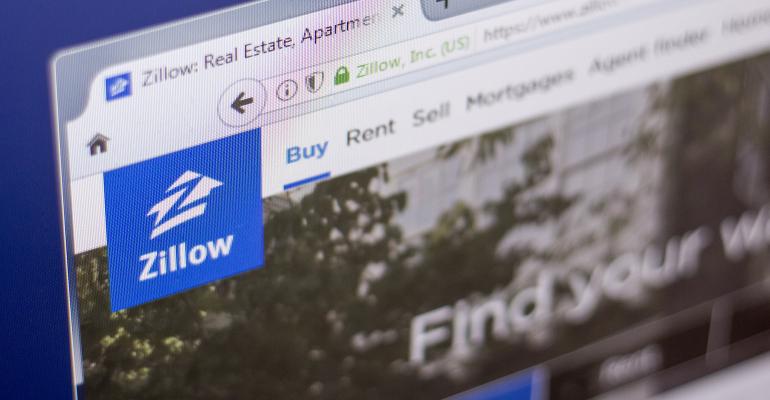(Bloomberg)—Faced with the fastest-rising real estate prices in U.S. history, Zillow Group Inc. tweaked the algorithms that power its home-flipping operation to make higher offers.
It ended up with so many winning bids that it had to stop making new offers on properties. Now, after buying more homes in the third quarter than it ever has before, the company is working through a backlog of houses that need to be fixed up and sold while facing an unpleasant reality: Slowing price appreciation means it will sell many homes at a loss.
Zillow put a record number of homes on the market in September, listing properties at the lowest markups since November 2018, according to research from YipitData. It also cut prices on nearly half of its U.S. listings in the third quarter, according to Yipit, signaling that its inventory was commanding prices lower than it expected.
The shift has been on display in places such as Atlanta and Phoenix, two markets where home prices have been surging. Zillow’s roughly 250 active listings in Phoenix are currently priced at 6% less, on average, than what the company paid for the homes.
That amounts to a $29,000 discount on the typical property, according to data compiled by Mike DelPrete, a real estate tech strategist and scholar-in-residence at the University of Colorado Boulder.
“Every key metric I’ve seen from Zillow over the past few months just doesn’t make sense,” DelPrete said. “It’s like it’s making decisions two to three months too late relative to the market.”
Zillow’s new-found aggressiveness was good for people like Abidemi Bolatiwa, who watched the process play out in real time. He sold his four-bedroom home in Phoenix to Zillow for $531,300 in late September, according to property records, paying a convenience fee that was less than what a traditional agent commission would have cost him.
Bolatiwa said he also solicited an offer from Opendoor Technologies Inc., which would have paid him roughly $504,000. Ten days after Zillow bought the home, it listed the property for $505,900. When it didn’t sell, the company cut the price by another $11,000 to $494,900.
While Opendoor, Zillow’s chief competitor, has also seen its spread on home sales in Phoenix shrink, it has continued to sell houses for more than it buys them for, according to DelPrete’s analysis. It’s also outperforming in Atlanta, where Opendoor is listing homes at a 6.5% premium to its purchase price, compared to Zillow’s 1.3% spread. A representative for Zillow declined to comment.
The company said on Oct. 18 that it would stop making new offers to buy homes while it works through the backlog, sending shares down by 9.4%. But the stock has recovered those losses, with analysts mostly shrugging off the operational stumble. The home-flipping operation, which dates to 2018, has yet to turn a profit.
“Prices turned on them and they got a little bit flat-footed and they were probably a little too aggressive on the bidding,” said Brad Erickson, an analyst at RBC Capital Markets. “They probably don’t care so much. It’s not as important at this stage of the game to make money.”
Zillow and Opendoor practice a high-tech spin on home-flipping called iBuying. The companies use software-powered algorithms to predict where home prices are going. They charge fees that take the place of the typical real estate agent commissions, pitching customers on the convenience of the service. Buying thousands of homes every quarter is a complicated process that requires a lot of precision to get right.
Zillow Chief Executive Officer Rich Barton has emphasized that making competitive offers is crucial to reaching the scale required to profit on the business. He lamented on an August call with investors that breakaway home price appreciation was expanding the spread between what it costs Zillow to buy and fix a house and what it sells the property for. That led the company, which bought 3,800 homes in the second quarter, to make higher offers as it pursues a goal of buying 5,000 homes a month by 2024.
“We saw rapid conversion gains throughout the quarter as we improved our offer strength,” he said.
Richard Flor talked to a real estate agent this summer about listing a three-bedroom, three-bathroom rental property he owned in Tolleson, Arizona, a suburb west of Phoenix, for around $390,000. Instead, he sold it to Zillow in September for about $412,000, according to property records, paying a 1% fee for the service.
Then he watched as Zillow made light repairs and relisted the house two weeks later for $387,000.
“I was thinking, ‘How are they making money?’” Flor said. “Maybe they know something I don’t.”
© 2021 Bloomberg L.P.





